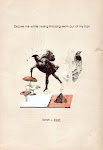
At one point in The Year of Magical Thinking, Joan Didion writes about reading an old book of etiquette on how to treat the bereaved, making the point that these days we’re willfully ignorant of death and, though she doesn’t say this, we cheat ourselves of preparation that could help us when our turn comes to grieve or to die. Somewhere along the line the pursuit of happiness became a duty rather than a choice and, as far as fashion goes, white the new black.
She also discusses re-reading the play Alcestis in trying to grasp the grey area between life and death, or if there’s a grey area between life and death and whether we can say things like “at so-and-so time he died.” In the play, Alcestis is with the ferryman crossing the river and shouts back to those left in life as she travels the divide. In the end she’s spared. Didion talks about how she comes back changed, how silent she is. (I couldn’t help but think of Ishiguro’s Never Let Me Go and how the donors, on an expedited track to death, treat the carers, who are not yet on that track, as other.)
I was thinking about the chronically ill and the chronically unhappy and old people who want to die, how in a way they’re in that grey area, and how we try to distract them and downplay their worries and pains, fill them with anti-depressants and pain killers because it’s uncomfortable to have death’s messengers among us, and if they’re not “making the most of it” then something needs fixing. And I was thinking of someone in my extended family who committed suicide and how he was outright denounced for it and how I felt sorry for him and I was thinking of all the families who want to deny that a loved one – a child, a parent – has committed suicide, how it must have been an accident, because we can’t grasp the desire to die, or, worse, we can, or in the case of the loved one, the suicide suggests some deficiency, some insufficiency in ourselves that shows we’ve failed. That happiness fails.
The Year of Magical Thinking was and wasn't about all that. Mostly it dealt on the year after Didion's husband died. I think magical thinking is a normal response to losing a loved one. But Didion told of the experience with such lucidity and candor, and such sanity, that it was exceptional.




No comments:
Post a Comment